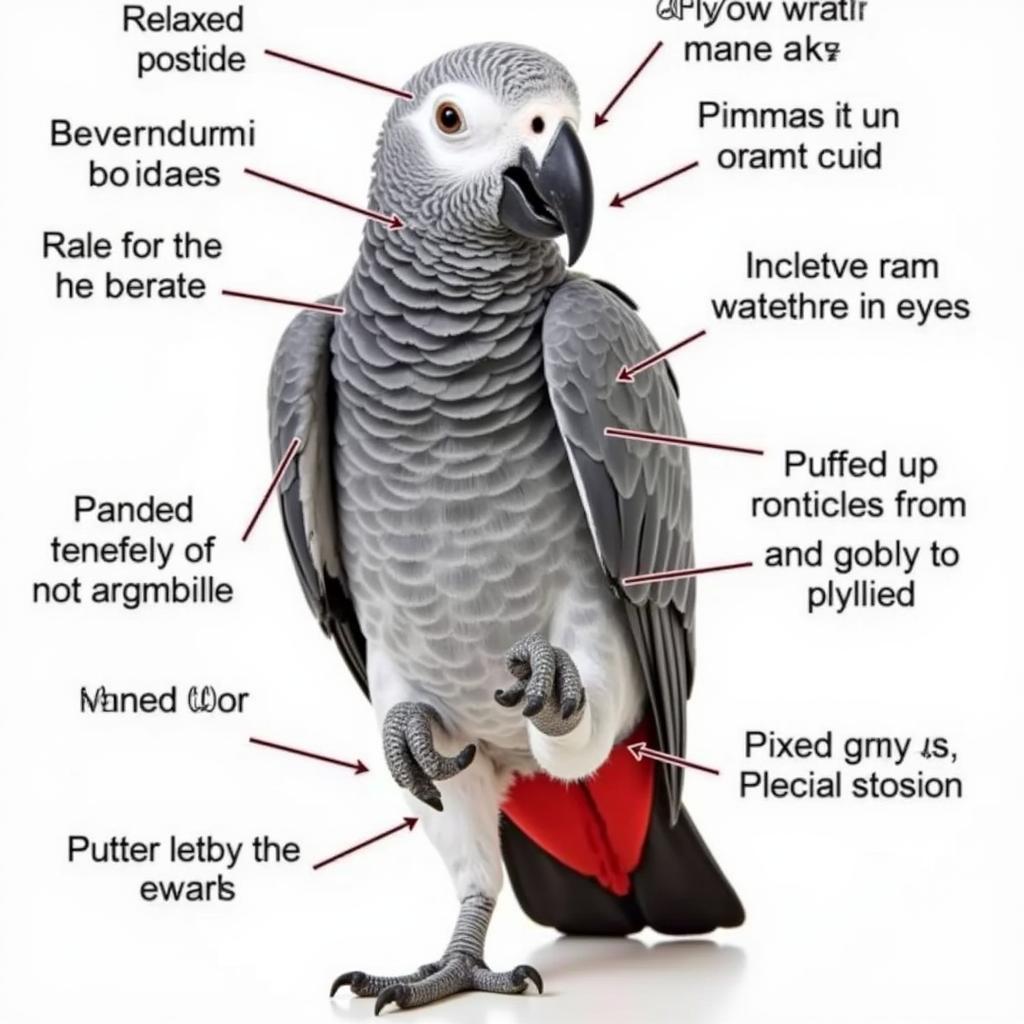Understanding African Grey Parrot Behavior
African Grey Parrot Behavior is a fascinating and complex subject. These intelligent birds exhibit a wide range of behaviors, from playful antics to complex communication. Understanding these behaviors is crucial for anyone considering owning or currently caring for an African grey. This article will delve into the intricacies of African grey parrot behavior, offering valuable insights into their needs and how to best interact with them.
Decoding the Nuances of African Grey Parrot Behavior
African greys aren’t just mimicking machines; they are highly intelligent creatures capable of problem-solving, emotional bonding, and even displaying empathy. Their behaviors are often reflections of their physical and emotional well-being, their environment, and their social interactions. A healthy, stimulated African grey will display a range of behaviors that demonstrate their intelligence and personality.
One key aspect of African grey parrot behavior is their vocalizations. Beyond mimicking human speech, they use a variety of calls, whistles, and clicks to communicate with their flock (in the wild) or their human companions (in captivity). Understanding these vocalizations can help owners better interpret their parrot’s needs and emotions. For example, a loud, repetitive squawk might indicate distress or boredom, while soft chirping could signify contentment.
Another important element is their body language. Like vocalizations, their body language offers valuable clues to their emotional state. A puffed-up posture can suggest fear or illness, while a relaxed stance with slightly ruffled feathers often indicates comfort and contentment. Observing subtle changes in posture, feather position, and eye movements can help owners anticipate their parrot’s needs and prevent potential behavioral issues. You can find more about their social interactions on our african grey parrot group page.
 African Grey Parrot Displaying Body Language
African Grey Parrot Displaying Body Language
The Importance of Enrichment for African Grey Parrots
Enrichment plays a vital role in maintaining a healthy and balanced African grey parrot behavior. These intelligent birds require mental and physical stimulation to thrive. Without it, they can become bored, frustrated, and even develop destructive behaviors like feather plucking. Providing a stimulating environment with a variety of toys, foraging opportunities, and social interaction is essential for their well-being.
Toys that encourage problem-solving, like puzzles and foraging toys, are particularly beneficial for African greys. These toys challenge their intelligence and help to keep them mentally engaged. Rotating toys regularly can also help prevent boredom and maintain their interest. Learn more about effective training techniques on our african grey training page.
Understanding African Grey Parrot Mating and Breeding Behaviors
Understanding African grey parrot mating and breeding behavior is essential for responsible ownership, especially for those interested in breeding. In the wild, African greys have specific courtship rituals and nesting behaviors. In captivity, it’s important to provide appropriate conditions and nesting sites if breeding is intended. For a deeper dive into their mating habits, check out our resource on african grey parrot mating. We also offer insights into their specific breeding behaviors on our dedicated african grey parrot breeding behavior page. Understanding these natural instincts is crucial for ensuring the well-being of these birds.
Social Dynamics within an African Grey Society
African grey parrots, in their natural habitat, demonstrate complex social interactions within their flock. Understanding these dynamics can provide insights into their behavior in captivity. They form strong bonds with their mates and offspring and communicate through a variety of vocalizations and body language cues. More information about their social structure can be found on our african grey society page.
Conclusion
Understanding African grey parrot behavior is a continuous journey. By observing their vocalizations, body language, and responses to different stimuli, owners can build a strong bond with their feathered companions and provide them with the enriching environment they need to thrive. Remember, a happy and stimulated African grey is a healthy African grey.
FAQ
-
Why does my African grey bite? Biting can be a sign of fear, aggression, or even a playful nip. It’s crucial to understand the context of the bite to address the underlying cause.
-
How can I stop my African grey from screaming? Excessive screaming can indicate boredom, loneliness, or even medical issues. Providing enrichment, social interaction, and a consistent routine can often help reduce screaming.
-
Do African greys need a lot of attention? Yes, African greys are highly social creatures and require a significant amount of interaction and attention to thrive.
-
How can I teach my African grey to talk? Positive reinforcement and repetition are key to teaching African greys to talk. Start with simple words and phrases and reward them for their efforts.
-
What are signs of a sick African grey? Changes in behavior, such as lethargy, loss of appetite, or changes in droppings, can be signs of illness. Consult an avian veterinarian if you notice any concerning symptoms.
-
How long do African greys live? With proper care, African greys can live for 50-80 years.
-
Are African greys good pets for beginners? African greys require a lot of time, patience, and commitment, and may not be the best choice for a first-time bird owner.
Other Possible Questions About African Grey Parrot Behavior:
- How do I handle feather plucking in my African grey?
- What are the best toys for stimulating an African grey’s intelligence?
- How can I create a safe and enriching environment for my African grey?
- What are the common signs of stress in African grey parrots?
- How do I introduce a new African grey to my existing flock?
Need further assistance? Please contact us at Phone: +255768904061, Email: kaka.mag@gmail.com or visit us at Mbarali DC Mawindi, Kangaga, Tanzania. We have a 24/7 customer service team.

